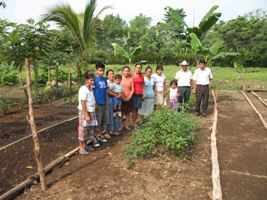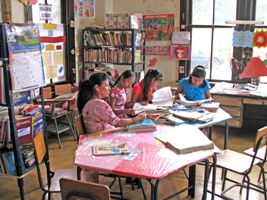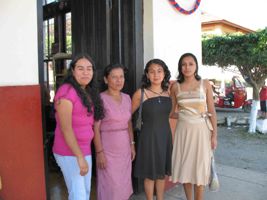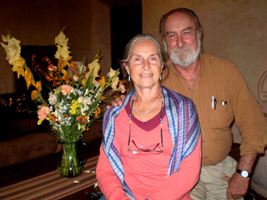In Part Two of this “She & He are Doing It” series, I spoke further with both Earl and Suzanne de Berge to learn more about the incredible work Seeds for the Future (Semillas para el Futuro) is doing in rural Guatemala and the challenges they face there.
Earl: Semillas’ work in Chocolá focuses in a few basic areas: education, food security and nutrition, and agricultural/economic diversification. This includes providing technical training and skills to grow things such as cacao, using native trees for timber as well as provide leadership and democracy training to help farmers identify common goals and develop practical and actionable plans for achieving them. This allows these growers, many of them women, to establish and manage a cooperative group that sell their crops at fair market value and earn a good return for their investment.
 Suzanne: Along with that, another focus of Semillas’ efforts encourages learning for all ages and genders. The public education system in Guatemala has many faults, and these are most evident in the poor and rural areas. NGOs such as Semillas’ must be creative in supporting youth and adult education programs that teach leadership, love of learning and problem-solving skills, and which provide information resources residents can draw upon for ideas and technical information. Semillas’ main effort in education is based on a partnership with the Riecken Foundation, which focuses on turning static community libraries (more like “jails for books”) into open centers of learning for all ages.
Suzanne: Along with that, another focus of Semillas’ efforts encourages learning for all ages and genders. The public education system in Guatemala has many faults, and these are most evident in the poor and rural areas. NGOs such as Semillas’ must be creative in supporting youth and adult education programs that teach leadership, love of learning and problem-solving skills, and which provide information resources residents can draw upon for ideas and technical information. Semillas’ main effort in education is based on a partnership with the Riecken Foundation, which focuses on turning static community libraries (more like “jails for books”) into open centers of learning for all ages.
 Earl: The Chocolá community provides a large well-kept 1890-era building for the library and pays the salary of a secretary/librarian and all building utilities. Semillas began funding Riecken’s activities in the fall of 2009. The Riecken team has recruited and provided organizational training to a local Library Committee. Committee members and volunteers have been trained in the application of the Dewey Decimal System to the collection, and in implementation of new library programs, including liberalized lending practices.
Earl: The Chocolá community provides a large well-kept 1890-era building for the library and pays the salary of a secretary/librarian and all building utilities. Semillas began funding Riecken’s activities in the fall of 2009. The Riecken team has recruited and provided organizational training to a local Library Committee. Committee members and volunteers have been trained in the application of the Dewey Decimal System to the collection, and in implementation of new library programs, including liberalized lending practices.
Suzanne: Approximately 60 Chocolá children and their families are active in the bi-weekly Children’s Story Hour, and 8 families have joined the recently implemented Early Reading Stimulation program. Riecken staff and Semillas members are culling and rebuilding the book collection. This successful program has moved into a second phase in which a local young woman, trained by the Riecken team, has been hired to support and promote the library program, thus shifting more responsibility to local control.
 Earl: The rural poverty in Chocolá and the social/educational structures which sustain it must be addressed locally. Instead of “top down” economic development (often fraught with corruption, poor administration, political favoritism and broken promises) our integrated, “bottom-up” approach offers training in teamwork, business and community skills via programs focusing on education, food security and agricultural diversity.
Earl: The rural poverty in Chocolá and the social/educational structures which sustain it must be addressed locally. Instead of “top down” economic development (often fraught with corruption, poor administration, political favoritism and broken promises) our integrated, “bottom-up” approach offers training in teamwork, business and community skills via programs focusing on education, food security and agricultural diversity.
The community-based model provides a path upward from subsistence, and at the same time supports the development of civil and democratic institutions. And empowering women is a core element, as is fostering education and critical thinking.
Suzanne: In the end, the community of Chocolá will become a regional training center and a living model that others can see and apply in their own communities.
If you would like to learn more, or find out how you can help, visit Seeds for a Future (Semillas Para el Futuro) as well as on Facebook @ SeedsForAFuture.
Gloria Feldt
Latest posts by Gloria Feldt (Posts)
- This Blog is No Longer Active… - March 17, 2014
- Women’s Equality Day and the Civil Rights March - August 26, 2013
- Stuck? Change Your Relationship With Power - July 21, 2013






 "Female Writers Kicking Up Literary Dust"
"Female Writers Kicking Up Literary Dust"